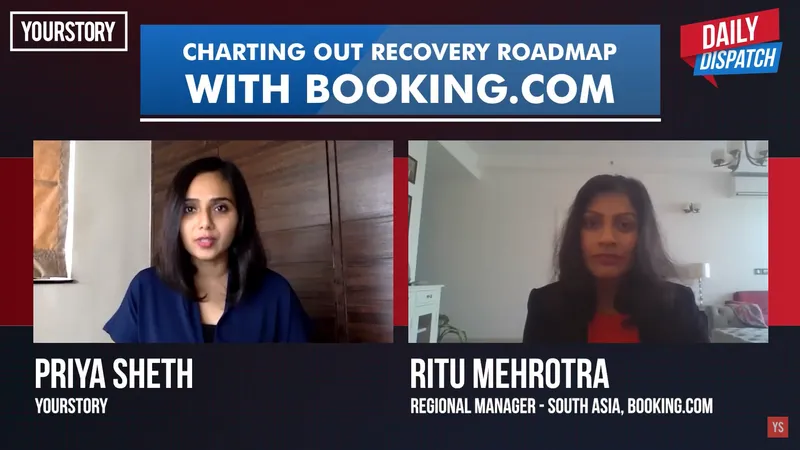Sustainable tourism will dominate travel industry: Ritu Mehrotra, Booking.com
After one of the most challenging years for travel and hospitality, Ritu Mehrotra of Booking.com, lists top trends that will dominate the industry in 2021.
COVID-19 changed travel as we knew it. After WHO announced the pandemic, governments across the globe imposed travel restrictions to curb the spread of the virus.
As a result, the travel and hospitality industries came to an abrupt halt. Several people were laid off and salary cuts were announced across the industry.
In a recent conversation with YourStory, Ritu Mehrotra, Regional Manager - South Asia, Booking.com, says, “The travel industry was the first one to be hit by the pandemic, and probably will be the last one to recover.”

Ritu Mehrotra, Regional Manager - South Asia, Booking.com, in conversation with Priya Sheth for YourStory Daily Dispatch
Ritu says that through the pandemic, one-third of airlines were shut down, and hotel room occupancies were down to five to 10 percent. But through the end of the year, certain segments started to pick up a bit. However, “This is not the fight of months or weeks. It will take us years for the (travel) industry and businesses to come back to normal,” she adds.
For Booking.com, reaching pre-COVID-19 levels will take time. While the last quarter was incremental, Ritu says that for the online travel platform, its businesses globally is nowhere close to where it is.
Travel trends to dominate in 2021
By the end of 2020, while governments lifted lockdowns and travel restrictions, people were still not confident enough to fly. However, short travels, “Closer to home and drivable distances” picked momentum, she says.
Listing the trends that will dominate the travel industry in 2021, Ritu lists:
- Domestic tourism making a comeback: International travel restrictions pushed domestic tourism like never before. “Especially in India, where domestic consumption is very high, people have a chance to see their own country, which is a good sign,” Ritu says. She adds that for people residing in Mumbai, Booking.com recorded traffic towards drivable travels to Lonavala and Goa.
- Alternative accommodation: Initially, when the lockdown was lifted, people were preferring alternative accommodation, such as villas, holiday homes, beach homes, and fort houses, essentially places that allowed one to move around. “However, that has passed now. We are seeing fairly even traffic as we move into 2021,” she adds.
- Short booking window: Towards the end of last year and the beginning of this year, people booked their holidays in short windows. That is, “People booked for holidays two days prior to the dates rather than planning for weeks,” Ritu says.
- Longer stay windows: On the other hand, with COVID-19 promoting the work from home culture, more people preferred booking longer stays. “One could rent a villa in Digha or Kullu and work from there...Booking.com launched weekly and monthly rates to facilitate that,” she adds.
- Work-friendly locations: Booking.com saw a surge in work-friendly locations — places with easy internet connections and secluded rooms.
- Weekend getaways and staycations: Travellers are preferring booking hotel rooms and villas that come with a lot of inclusion in order to avoid eating out or venturing out. Ritu says that packages that include meals are more in demand.
- Sustainable tourism: The pandemic made travellers realise the impact of their actions on nature. Booking.com provides options to travellers to choose if they want to stay at a sustainable accommodation.
Going ahead, safety will be at the top of mind of travellers. Ritu emphasises that in 2021, safety and sanitation protocols will continue, domestic tourism will dominate the Indian travel industry.
“It beautifully aligns with the Prime Minister’s vision of Dekho Apna Desh,” says Ritu. And finally, travellers will be at a lookout for flexible deals.
Check out YourStory’s exclusive chat with Ritu Mehrotra, Regional Manager- South Asia, Booking.com here.
Edited by Saheli Sen Gupta








